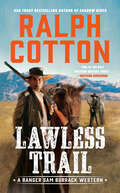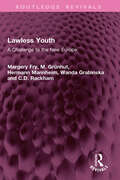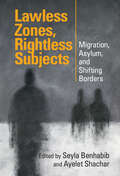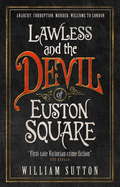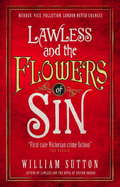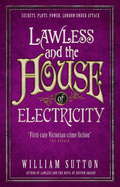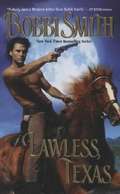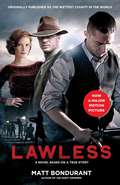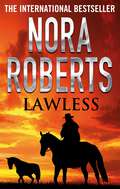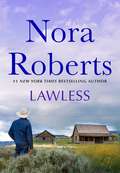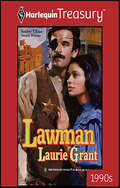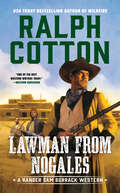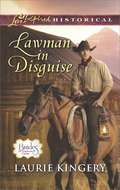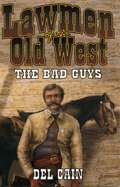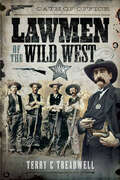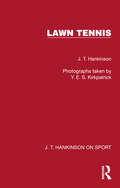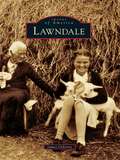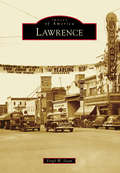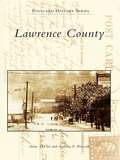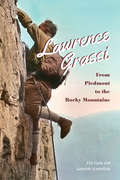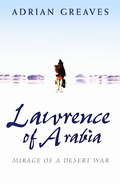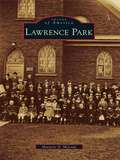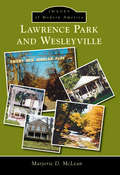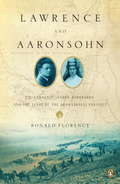- Table View
- List View
Lawless Trail
by Ralph CottonA Family Affair The Traybo brothers have a reputation for being gentleman outlaws-the kind who will make polite chatter as they take your life savings. But Ranger Samuel Burrack has no sympathy for those who show poor manners when it comes to obeying the law. He’s traveled as far as the Mexican Badlands to pick up the Traybo brothers’ ex-cohort Fatch Hardaway to lead him to his prey. Burrack isn’t alone on his pursuit. Ranger Dallas Garand and his gang let the Traybo brothers slip through their fingers during a robbery once before, and they don’t plan on letting history repeat. Instead of joining forces with Burrack to create a unified front, though, Garand is going his own way. It’s Garand against Burrack on the trail of these criminal brothers-and may the best ranger win. . . . More Than 2. 5 Million Ralph Cotton Books in Print .
Lawless Youth: A Challenge to the New Europe (Routledge Revivals)
by Hermann Mannheim Margery Fry M. Grünhut Wanda Grabinska C.D. RackhamLawless Youth (1947) is a book prepared under the auspices of the International Committee of the Howard League for Penal Reform during the Second World War, aiming for the day when peace could offer the opportunity for advance on the lines of justice and humanity. The authors visualised the grim reality of winning back for society the children and young men and women whom war had made rebels and outlaws, inured to violence. The chapters published here are the results of great thought, and offer the ideal for dealing with the youth of the day.
Lawless Zones, Rightless Subjects: Migration, Asylum, and Shifting Borders
by Seyla Benhabib Ayelet ShacharResponding to ever-increasing pressures of migration, states, supranational, and subnational actors deploy complex moves and maneuvers to reconfigure borders, rights, and territory, giving rise to a changing legal cartography of international relations and international law. The purpose of this volume is to study this new reconfiguration of rights, territoriality, and jurisdiction at the empirical and normative levels and to examine its implications for the future of democratic governance within and across borders. Written by a diverse and accomplished group of scholars, the chapters in this volume employ legal, historical, philosophical, critical, discursive, and postcolonial perspectives to explore how the territoriality of the modern states – ostensibly, the most stable and unquestionable element undergirding the current international system – has been rewritten and dramatically reimagined. This title is also available as Open Access on Cambridge Core.
Lawless and the Devil of Euston Square
by William SuttonLondon, 1859. Great exhibitions. Foreign conquests. Underground trains. The era of Victorian marvels is also the time of the Great Stink. Beneath the respectable surface, a multitude of ills need flushing out. When a man is killed in a hydraulic burst, novice detective Campbell Lawless stumbles on to the trail of Berwick Skelton: this elusive activist rose from humble beginnings to cross swords with London's illuminati, before vanishing, heartbroken, amid presages of disaster. The Worms, a gang of urchins, help Lawless investigate the 'Skeleton Thefts' mystifying society, revealing to him the disillusion that lurks beneath the filthy cobblestones. Berwick's trail leads to music hall hoofers, industrial sabotage and royal scandal. Lawless peels away veneers of secrecy to convince the powers-that-be of Berwick's revolutionary plans. Can he track down the underworld mastermind before he wreaks vengeance on those who ride roughshod over his people?
Lawless and the Flowers of Sin: Lawless 2
by William SuttonIt is 1863, and as a reluctant Inspector of Vice, Campbell Lawless undertakes a reckoning of London's houses of ill repute, a shadowy netherworld of frayed glamour and double standards, mesmerising and unspeakable by turns. From the erotic booksellers of Holywell Street to the alleys of Haymarket, he discovers backstreet cast-offs and casualties of the society bordellos, and becomes fascinated by a musician who has established a foundation for fallen women. But his inquiries draw the attention of powerful men, who can be merciless in defending their reputations. Lawless must unlock the heart of a clandestine network, before he too is silenced...
Lawless and the House of Electricity: Lawless 3
by William SuttonIn London’s East End, a corpse tumbles from a ship. Tangled in tarpaulin, it has lain forgotten for years. A scrap of paper in its pocket reads ‘Roxbury’. The shadows of European machinations loom over the capital. For Sergeant Campbell Lawless, fears become reality as a series of explosions tear across the country. Home Office anxieties lead Lawless to Roxbury House, where the Earl of Roxbury, the country’s foremost weapons manufacturer, resides with a cavalcade of innovative scientists and researchers. Lawless places his best agent, ex-street urchin Molly, in the Earl’s home as he races to find those behind the attacks before the tinderbox of Europe is ignited.
Lawless, Texas
by Bobbi SmithIt was a town whose reputation matched its name-a place where the sheriff had been shot dead, outlaws ran wild and a decent woman wasn't safe to walk the streets at night. But Jace Madison planned to change all that. Ever since his fiancee had been killed by a stagecoach robber he'd devoted his life to bringing law and order to the wild West. He had no time for female companionship, especially not with a little hellcat who looked more like a boy than a girl and was equally proficient with a whip or a gun. Yet love has a way of sneaking up on a man: Sammie Preston was an armful of trouble even Jace couldn't tame, and she was about to get the drop on his heart.
Lawless: A Novel Based on a True Story
by Matt BondurantWith a Foreword by Director John Hillcoat Based on the true story of Matt Bondurant's grandfather and two granduncles, Lawless is a gripping tale of brotherhood, greed, and murder. The Bondurant Boys were a notorious gang of roughnecks and moonshiners who ran liquor through Franklin County, Virginia, during Prohibition and in the years after. When Sherwood Anderson, the journalist and author of Winesburg, Ohio, was covering a story there, he christened it the "wettest county in the world." Anderson finds himself driving along dusty red roads, piecing together the clues linking the brothers to "The Great Franklin County Moonshine Conspiracy," and breaking open the silence that shrouds Franklin County. In vivid, muscular prose, Matt Bondurant brings these men--their dark deeds, their long silences, their deep desires--to life. His understanding of the passion, violence, and desperation at the center of this world is both heartbreaking and magnificent.
Lawless: Lawless The Law Is A Lady
by Nora RobertsAVAILABLE DIGITALLY FOR THE FIRST TIMEIn Nora Roberts' novel Loving Jack, author Jackie 'Jack' MacNamara finds love while writing a historical romance set in Arizona in the late 1800s. This is her story... Half-Apache Jake Redman is as untamed as the rugged land he calls home. Living by his own code, the gunslinger has little tolerance for rules and regulations - especially the kind that Sarah Conway lives by. Her talents for entertaining and social niceties have little worth in the Old West. But the Eastern beauty has the heart of a pioneer under her ladylike demeanour. It's a combination that could prove lethal to Jake...Includes a preview of Whiskey Beach, published in April 2013
Lawless: Lawless The Law Is A Lady (Loving Jack Ser.)
by Nora RobertsA historical romance set in America’s Old West, Lawless is “a novel by Jackie MacNamara,” the book written by the character in #1 New York Times bestselling author Nora Roberts’ Loving Jack.In the late 1800s, the Arizona Territory was an unsettled, wild frontier traversed by the likes of Jake Redman. Prejudiced against for his partial Apache parentage, the gunslinger had little patience for the civility practiced by Sarah Conway. Yet she brought more than polite manners from her east coast city society, possessing a strength of character needed to make the western town of Lone Bluff her home—and an enticing, fiery passion as dangerous to Jake as anything he ever faced with a six-gun.
Lawman
by Laurie GrantOlivia Didn't Believe in Second ChancesShe and Cal Devlin had been in love a lifetime ago, before she'd lost everything and been branded a "scarlet woman." And though she longed for nothing more than to be back in Cal's arms, their passion could only mean his ruin...!Caleb had learned that some Texans never forgave their native sons who fought for the Union, but as the new lawman in town, he was determined to prove himself worthy of respect, and win back the heart of the woman he'd left behind.
Lawman From Nogales
by Ralph CottonArizona Ranger Sam Burrack is hunting Luis and Teto Torres, the notorious leaders of the ruthless Gun Killers Gang. Little does he know that an ambush is waiting for him in the town of Wild Roses. Only the courageous actions of the beautiful Erin Donovan keep the ranger from meeting his end. But Erin has a secret that may prove deadlier than any ambush. .
Lawman in Disguise
by Laurie KingeryThe Lawman's Secret When her son discovers an injured outlaw in their barn, the mysterious stranger instantly turns widow Daisy Henderson's world upside down. But Daisy senses Thorn Dawson's a good man...and there's more to his story than he can tell her. So she can't turn him away before he heals, even if she's falling for him-something she swore she'd never do again after her husband died. An undercover lawman, Thorn never lets himself get too close to anyone. But that's before he meets single mother Daisy and her spirited son. Now Thorn has to protect them from the Griggs gang-a gang that's come to accept him as one of their own. And if he can't keep up the charade, the woman of his dreams might just pay the price.
Lawmen of the Old West: The Bad Guys
by Del CainSome of the law officers who served the West during the last half of the nineteenth century drifted from one side of the law to the other and sold their talents to whichever side offered the most advantage. Others used their positions as cover for their criminal activities. The lawmen in this book were serious offenders against the laws they had at one time sworn to uphold. Their skills were honed in range wars and family feuds and polished along the cattle trails, in the saloons and banks, and on the trains of the West. Some of them did good work enforcing the law when that was their job. Others had equally successful careers on the other side of the law. More than one kicked out their lives at the end of ropes strung up by citizens who were outraged by their abuse of the trust that went along with the badge they wore. These are their stories.
Lawmen of the Wild West
by Terry C. TreadwellWithout doubt it was one of the toughest jobs. Faced with ruthless criminal, trigger-happy gunslingers and assorted desperados, the lawmen of the Old West tried, and sometimes died, in their efforts to bring some semblance of order to their towns and communities. There were Marshals, City Marshals and Constables who were employed by the local townspeople and whose authority was restricted to within the town or city limits. Then there were the County Sheriffs, who were elected by the citizens of the county, to keep the peace within the county, or the Texas Rangers and Arizona Rangers, who operated under the jurisdiction of their respective state governors and later US Marshals. The United States Marshals were appointed by the President of the United States and had the authority to operate anywhere in the USA and deal with federal crime. Each of these law enforcement officers employed their own deputies, all of whom had the same powers of enforcement. Some believed that former criminals would make the most effective lawmen. Consequently, in some cases notorious gunfighters were employed as town marshals to help bring law and order to some of the most lawless of towns. These lawmen had to deal with the likes of the Dalton Gang, the James Brothers and the Rufus Buck Gang who thought nothing of raping and murdering innocent people just for the hell of it. These outlaws would frequently hide in the Indian Territory where there was no law to extradite them. The only law outside of the Indian Territory was that of Judge Isaac Parker, who administered the rules with an iron fist; the gallows at Fort Smith laid testament to his work. The requirements needed to be a peace officer in the Wild West were often determined only by the individual’s skill with a gun, and their courage. At times judgment was needed with only seconds to determine it, and that also meant that there was the odd occasion where justice and law never quite meant the same thing. The expression ‘justice without law’ was never truer than in the formative years of the West.
Lawn Tennis (J. T. Hankinson on Sport)
by J. T. HankinsonOriginally published in 1951, in Lawn Tennis Mr Hankinson produced something that was outstandingly original at the time. The intention was to teach the game from the very beginnings, and to this end the written description was reduced to a minimum, and, so far as possible, the teaching was built up round the photographs. In some of these Mr Hankinson introduced four most life-like puppets, which he named the Lawn Tennis Quads, and they most effectively demonstrate the principles of the basic strokes. They are supported by action shots of young players. The author also constructed a model lawn tennis court, and to illustrate the more simple tactical situations of the game the puppets were invited to play singles and doubles on this court.The author’s previous titles had been very successful and yet this new volume seemed to reach a new level of carefully planned instruction. The introduction of the puppets was said to be a stroke of genius, and the skill shown in setting them up to demonstrate the technique of the strokes was masterly. The pictorial ingenuity may have overshadowed the text, but, apart from the more descriptive items there are stimulating chapters entitled “How to Watch a Match” and “Yourself and the Game.” Today it can be enjoyed in its historical context.
Lawndale
by James OsborneLocated in the exact geographical center of Los Angeles County's South Bay district, Lawndale was originally barley fields, then chicken ranches and small farms, growing vegetables for sale in nearby Inglewood and Redondo Beach. Retaining some of its rural character even after World War II, Lawndale gradually transformed into suburbia along with nearby communities, fighting all the while to retain its own identity and staving off aggressive annexation bids by surrounding cities. Finally in 1959, Lawndale incorporated, ending civic contentiousness. Despite the bustle of the high-end Galleria at South Bay, as well as Lawndale's close proximity to some of the most tourism-friendly beach cities in California and its bisection by L.A.'s busiest freeway, the I-405, the city's neighborhoods on the outskirts of Los Angeles International Airport retain the quiet ambiance evinced by its bedroom-community name.
Lawrence
by Virgil W. DeanWith its skyline dominated by the campus of the University of Kansas, the history of Lawrence cannot be divorced from the history of the academy, its influence, and impact. The history of any town, however, is much more than the story of one institution or issue. Lawrence is also a river town, located in an agriculturally rich valley, and Massachusetts Street, its main commercial street, harkens back to its mid-19th century New England origins and influences. Lawrence is also a place of diversity and change, a community where space is contested and disparate opinions make for vital public discourse.
Lawrence County
by Anita Devivo Anthony P. WalczakLawrence County was named for naval captain James Lawrence, who gave the famous command "Don't give up the ship" during the War of 1812. His command became a slogan for western Pennsylvanians in the early 1800s when what was to become Lawrence County was divided between Mercer County and Beaver County. In 1820, residents started to protest the inconvenience of conducting business in two jurisdictions and proposed a new county to unify the community. They did not give up the ship. Finally in 1849, Lawrence County was authorized. The new county was rich with rolling hills, rivers, forests, and fertile land. Limestone, iron ore, coal, and clay supported burgeoning industries. Lawrence County illustrates the effect of these industries on the area through more than 200 vintage postcards and photographs. Also illustrated are the Old Order Amish and places such as Possum Hollow, Breakneck Bridge, SNPJ, and Energy.
Lawrence Grassi
by Gabriele Scardellato Elio CostaLawrence Grassi was a trailblazer in every sense of the word. A working-class man of humble Italian origins who worked as a labourer and a coal miner for most of his life, Grassi had a deep passion for the Rocky Mountains. He was famous in the region for his commitment as a guide, a mountain climber, and a builder of greatly admired hiking trails. Today, in or near Canmore, his name graces a mountain, two lakes, and a school, and he is commemorated at Lake O'Hara in Yoho National Park.In Lawrence Grassi: From Piedmont to the Rocky Mountains, Elio Costa and Gabriele Scardellato uncover the deeply private man behind this legend, from his birth in the small Italian village of Falmenta to his long and inspirational career in Canada. Using previously unexamined family letters and extensive information on Grassi's cohort of Italian immigrants, the authors reconstruct his personal and professional life, correcting myths and connecting his story to the long history of Italian immigration to Canada. The definitive biography of this Canadian mountain hero, Lawrence Grassi will be essential reading for those interested in the history of immigration, sport, and the Rocky Mountains.
Lawrence Of Arabia: Mirage Of A Desert War
by Adrian GreavesA new biography of Lawrence of ArabiaT.E. Lawrence is one of the most enigmatic characters in British history. At the outbreak of the First World War he was working as an archaeologist in the Middle East. He had no military training at all, and a strong distrust of politicians and senior officers alike. And yet he succeeded in a task where all these people had failed: not only did he unite the Arab nation - a nation at perpetual war with itself - but he also led them to victory against the Ottoman Empire.How he managed to achieve these incredible feats has fascinated and confounded historians ever since. The myths that have grown up around this remarkable man have been enhanced by the untruths Lawrence himself propagated. He was never captured and tortured by the Turks as he claimed, neither was he the first to target Ottoman troops by dynamiting their trains. And yet the truth is every bit as compelling as the fiction. He was far more ruthless than he portrayed himself, and the battles he fought were every bit as barbarous as those fought by his Ottoman enemies. He was also strangely determined not to take credit for his achievements: when offered the VC at Buckingham Palace he refused it, leaving the king holding the box.This brand new biography by the author of RORKE'S DRIFT uses primary sources to uncover the truth from all the fictions that surround this legendary man. It covers the actualities of the war Lawrence fought in greater detail than ever before, and also describes what happened to Lawrence after the war.
Lawrence Of Arabia: Mirage Of A Desert War
by Adrian GreavesA new biography of Lawrence of ArabiaT.E. Lawrence is one of the most enigmatic characters in British history. At the outbreak of the First World War he was working as an archaeologist in the Middle East. He had no military training at all, and a strong distrust of politicians and senior officers alike. And yet he succeeded in a task where all these people had failed: not only did he unite the Arab nation - a nation at perpetual war with itself - but he also led them to victory against the Ottoman Empire.How he managed to achieve these incredible feats has fascinated and confounded historians ever since. The myths that have grown up around this remarkable man have been enhanced by the untruths Lawrence himself propagated. He was never captured and tortured by the Turks as he claimed, neither was he the first to target Ottoman troops by dynamiting their trains. And yet the truth is every bit as compelling as the fiction. He was far more ruthless than he portrayed himself, and the battles he fought were every bit as barbarous as those fought by his Ottoman enemies. He was also strangely determined not to take credit for his achievements: when offered the VC at Buckingham Palace he refused it, leaving the king holding the box.This brand new biography by the author of RORKE'S DRIFT uses primary sources to uncover the truth from all the fictions that surround this legendary man. It covers the actualities of the war Lawrence fought in greater detail than ever before, and also describes what happened to Lawrence after the war.
Lawrence Park
by Marjorie D. McleanLawrence Park was planned, developed, and built by the General Electric Company in 1910, when the company decided to build their plant near Erie, Pennsylvania. However, Lawrence Park was not to be a company town, but rather a planned community in the "English garden" concept. The tree-lined streets, flowering boulevards, and delightful parks are a testimony to those visionaries. Around 1900, the elegant Grove House Hotel was built on the banks of beautiful Lake Erie, and later a lively amusement park flourished there. The Stone House, built in 1832 and rumored to be a station in the Underground Railroad, still stands at the crossroads. The early settlers of Lawrence Park laid the foundation for a caring community that today enthusiastically embraces school and community activities.
Lawrence Park and Wesleyville
by Marjorie D. McleanLawrence Park Township and Wesleyville Borough are suburbs of Erie, Pennsylvania, and both communities are proud of their comfortable residences, many churches, parks, and business districts. Wesleyville grew along Buffalo Road, while Lawrence Park was developed by the General Electric Company a century later. Four Mile Creek, with its picturesque wanderings, is shared by both communities, and local legend suggests that it might have played a part in the Underground Railroad and the activities of rumrunners. In the early 1960s, the rival schools of the two communities merged to form the Iroquois School District. Amazingly, in 1965-1966, the first year of the merged district, the football team won the Erie County league championship. Many more accolades have come to Iroquois students for athletics, music, art, and intellectual achievements, and it is certain that they will continue, so "Roll on Big I."
Lawrence and Aaronsohn: T. E. Lawrence, Aaron Aaronsohn, and the Seeds of the Arab-Israeli Conflict
by Ronald FlorenceThe rivalry that presaged the world?s most tenacious conflict As the Arab -Israeli conflict continues to plague the Middle East, historian Ronald Florence offers extraordinary new insights on its origins. This is the story of T. E. Lawrence, the young British officer who became famous around the world as Lawrence of Arabia, Aaron Aaronsohn, an agronomist from Palestine, and the antagonism that divided them over the fate of the dying Ottoman Empire during World War I?a clash of visions that set Arab nationalism and Zionism on a direct collision course that reverberates to this day.
